Where ever I travel, especially during commutes you will see me carrying a book. My goal is to read all the books that had a big impact on the history of humanity and the world. My comments to the ones I already read are below collected in the section on political and religious ideologies.
Besides that I read everything across the literary spectrum that ends up in my hands. Interesting enough the books that really resonated with me on a personal level all found their way to me through some other people, sometimes on very strange paths. (always open for other recommendations especially orthogonal to my list here)
Note: I supplied most books with a link to a place where you can buy it. This is for mere convenience, so I don’t have to summarize the content and just collect my personal comments on the books here. There might exist other/cheaper places to find these books.
Reading List: manufacturing consent, The history of western philosophy, Subtle is the Lord,
Personal Favourites
Hermann Hesse
His books tell the tale of a very interesting character that I would have loved to meet.
 By far my most favorite book. It connects to my life in so many ways. Both positive and negative. I can associate people in my life to almost every character in the story. The best though being that I made it to the end of the story and my life goes now beyond the book. (As Hesse puts it himself in a foreword: “[…] The Steppenwolf pictures a disease and crisis – but not one leading to death and destruction, on the contrary: to healing.”)
By far my most favorite book. It connects to my life in so many ways. Both positive and negative. I can associate people in my life to almost every character in the story. The best though being that I made it to the end of the story and my life goes now beyond the book. (As Hesse puts it himself in a foreword: “[…] The Steppenwolf pictures a disease and crisis – but not one leading to death and destruction, on the contrary: to healing.”)
Last but not least Hesse wrote the book during a winter he spent in Basel and according to sources (and everyone who knows the city will sense it) for most of the book Basel served as a blueprint. A minor part was also inspired by Zurich.
 When reading it I had this weird sense of understanding, not so much of the novel itself but of the person who wrote it. I can’t figure where this is coming from and it is most likely an illusion, so here just some of my favorite lines from the novel (in German) which I can relate to most:
When reading it I had this weird sense of understanding, not so much of the novel itself but of the person who wrote it. I can’t figure where this is coming from and it is most likely an illusion, so here just some of my favorite lines from the novel (in German) which I can relate to most:
“Wenn du einen Stein ins Wasser wirfst, so eilt er auf dem schnellsten Wege zum Grunde des Wassers. So ist es, wenn Siddhartha ein Ziel, einen Vorsatz hat.”
“Woher denn, fragte er sein Herz, woher hast du diese Fröhlichkeit? […] Oder davon, dass ich entronnen bin, dass meine Flucht vollzogen ist, dass ich endlich wieder frei bin und wie ein Kind unter dem Himmel stehe? O wie gut ist dies Geflohensein, dies Freigewordensein!”
“Und eben daran, so schien es ihm jetzt, war er vorher so sehr krank gewesen, dass er nichts und niemand hatte lieben können”
“Die Wunde aber brannte noch, sehnlich und bitter gedachte Siddhartha seines Sohnes, pflegte seine Liebe und Zärtlichkeit im Herzen, liess den Schmerz an sich fressen, beging alle Torheiten der Liebe. Nicht von selbst erlosch diese Flamme.”
“Tief fühlte er die Liebe zu dem Entflohenen im Herzen, wie eine Wunde, und fühlte zugleich, dass ihm die Wunde nicht gegeben war, um in ihr zu wühlen, dass sie zur Blüte werden und strahlen müsse.”
“Hell glänzte sein Lächeln, als er den Freund anblickte, und hell glänzte nun auch auf Siddharthas Gesicht dasselbe Lächeln auf. Seine Wunde blühte, sein Leid strahlte, sein Ich war in die Einheit geflossen.”
“Weisheit ist nicht mitteilbar. Weisheit, welche ein Weiser mitzuteilen versucht, klingt immer wie Narrheit. […] Wissen kann man mitteilen, Weisheit aber nicht. Man kann sie finden, man kann sie Leben, man kann von ihr getragen warden, man kann mit ihr Wunder tun, aber sagen und lehren kann man sie nicht.”

Another book that found its way to me when I was ready for it. A beautiful story about following your dreams, but most importantly also trusting your guts. You have to keep your eyes open in live for opportunities and grab them when they appear without too much fear or hesitation. It is also a reminder that to reach your goal might require long detours but as long as you keep your dream in your heart and are willing to jump on the next opportunity, those detours don’t mean that you are lost, you are simply getting carried by life to the place where you are supposed to be at the moment. Your goal will be reached soon enough. But if you were to narrowly focused on a single goal you might miss most of what life has to offer. Importantly though following your goals also requires you sometimes to say goodbye, to leave places where you build a comfortable nest. You have to move on when you want to develop despite all the pain that comes with it. Overall a beautiful book that I highly recommend.
The Subtle Art of Not Giving a F*ck
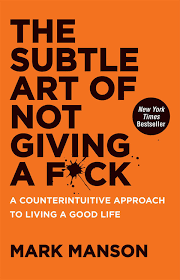
When you find yourself frustrated at the world because you trusted the wrong people (again) and this song sounds like your personal anthem then this is the perfect book for you. In contrast to what the title suggests it is not a book about how not to give a fuck, but about how to give better fucks, how to focus your fucks where they really matter. In fact it is a manifest for radical self-responsibility. If you waste your fucks on people who weren’t worth it, well though luck that is on you because you decided to spend your fucks on them. That doesn’t mean that they are good people, not at all, it just means that in the end it is always your responsibility where you chose to spend your fucks. So when you find yourself in a situation where you realize that you spent waaaay too many fucks on somebody of whom you figure out you completely misjudged their character, then you should have a look at your values and the way you allocate your fucks to figure out how you went so wrong with them and to make better allocations of your fucks in the future. Good read, recommed to spend some fucks on this.
 One of the most beautiful novels I have read. I find it most intriguing how he portrays the difficulties in social interactions on both extremes of the intellectual scale. Further the psychological development of the main character is way too real.
One of the most beautiful novels I have read. I find it most intriguing how he portrays the difficulties in social interactions on both extremes of the intellectual scale. Further the psychological development of the main character is way too real.
Only book that ever made me cry.
.
.
.

A historic novel staged in Egypt and the Middle East. It is a portrayal of the social relations and superstitions at the time (or at least a literary approximation thereof). It gains a lot of its charm from the fact that its main character, the narrator, is an anti-hero. It is quite entertaining but at times a bit lengthy especially in the second half.
For me the book fits in a curious set of books that came to me through other people but resonate (in parts) strongly with certain segments of my life. In this case the curiosity is increased by the fact that I received the book in 2010 but only started reading it in 2018 and the segment of my life it resonates with lays just one month prior to me finally picking up the book.
 A SciFi novel in which the action mostly takes place on the dessert planet Dune. The interesting thing is that it combines futuristic technology with a medieval societal structure. The plot develops around intrigues and a struggle for power between different houses. It is interesting how the influence of the environment on a people’s culture is developed in this fictional setting. Environmental necessities dictate cultural norms.
A SciFi novel in which the action mostly takes place on the dessert planet Dune. The interesting thing is that it combines futuristic technology with a medieval societal structure. The plot develops around intrigues and a struggle for power between different houses. It is interesting how the influence of the environment on a people’s culture is developed in this fictional setting. Environmental necessities dictate cultural norms.
It adds to the list of books which got to me through somebody and happened to resonate with me on a deeper level. It reminded me of the following poem which I wrote a year before the book found its way into my reading list:
A Warriors Soul
A warrior in times of peace
is rarely really at ease
though nobody hates war more
after all he s the one most soar
though he feels most alive
when he has to fight
that’s when he is one with the light
when he aligns with the purpose of his life
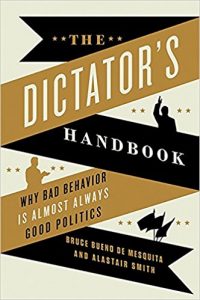 If you’re interested in politics this book is a must read. Especially when you like to understand the bigger picture how systems drive outcomes independently of the actual people who fill the roles. Since I read this book the world makes a lot more sense to me, even in these ridiculous times. One thing I like most about this book is, that it does away with classifications into dictatorships and democracies but introduces a set of continuous parameters that determine how power in a country (or company for that matter) operates. Also it does away with the notion of absolute rulers, as those simply do not exist.
If you’re interested in politics this book is a must read. Especially when you like to understand the bigger picture how systems drive outcomes independently of the actual people who fill the roles. Since I read this book the world makes a lot more sense to me, even in these ridiculous times. One thing I like most about this book is, that it does away with classifications into dictatorships and democracies but introduces a set of continuous parameters that determine how power in a country (or company for that matter) operates. Also it does away with the notion of absolute rulers, as those simply do not exist.
.
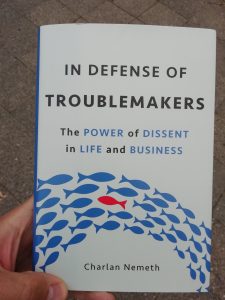
One of the most interesting books I have read in a while. Consider it to be essential reading for everyone who aspires for a leadership position in any organization. It highlights the value of dissent in decision making in a group backed up by decades of solid scientific research. One of the most interesting insights to me was the fact, that dissent improves the quality of decision making even if the position of the dissenter is wrong. That triggered me to rethink the role of conspiracy theorists in a democratic society. I am still contemplating whether the discussions in the book are still applicable in that case thinking of the fact that conspiracies around vaccines fuel vaccine hesitancy and thus pretty directly lead to needless deaths. Another interesting aspect of the research presented in the book was the fact, that pretended dissent (devil’s advocate) does not work the same magic as apparently it doesn’t trigger the same social reactions as honest dissent. I reckon some mobbing experiences during my youth were partially responsible for the fact that today I often actually enjoy the role of the dissenter. Those experiences hardened me towards the negative side effects that come with the role of the dissenter (thus reducing their impact) and I learned to appreciate that as a dissenter you can have a much larger impact on a discussion. So I tend to favor career paths and political topics that bring me into this position.
The book is also valuable for those that try to change organizations or societies from below. To win an argument from a minority position is a long shot and requires a much more sophisticated approach than required to defend the majority position. I was wondering though how these findings apply to situations with power imbalance (think student reps to university board) as looking back on all the (university) politics stuff that I have done, it felt like a validation of what often felt like a fruitless and unthankful endeavor (however it isn’t entirely clear whether these findings apply in this context).
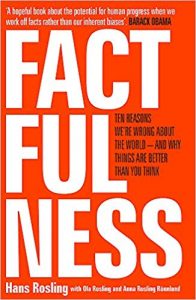 This is probably one of the most important books written in recent years. With all the negative news going on and the perceived negative developments it is refreshing to see, that the world is actually better than we think. Poverty is declining, education increases, life expectancy increases and so on and so forth. That doesn’t mean that things in the world are good. Definitely not. But the most important line in the book in my opinion is “Things can at the same time be bad and better”. If we see that things are getting better, that what we re doing actually helps, then it makes us more optimistic to keep going to keep fighting the fight for improvements instead of burying our head in the ground because things are still bad despite all our efforts. The second point he makes as a consequence: If we really care about an issue the first thing we should do about it, is to measure it. The better the data the better informed are out decisions on how to tackle it.
This is probably one of the most important books written in recent years. With all the negative news going on and the perceived negative developments it is refreshing to see, that the world is actually better than we think. Poverty is declining, education increases, life expectancy increases and so on and so forth. That doesn’t mean that things in the world are good. Definitely not. But the most important line in the book in my opinion is “Things can at the same time be bad and better”. If we see that things are getting better, that what we re doing actually helps, then it makes us more optimistic to keep going to keep fighting the fight for improvements instead of burying our head in the ground because things are still bad despite all our efforts. The second point he makes as a consequence: If we really care about an issue the first thing we should do about it, is to measure it. The better the data the better informed are out decisions on how to tackle it.
Last but not least his most important economic lesson: Most economic growth will happen in the regions where people currently live on Level 1-3. Developing affordable products for emerging markets might yield much larger economic potential then gaining another percent of the highly competitive markets on Level 4.
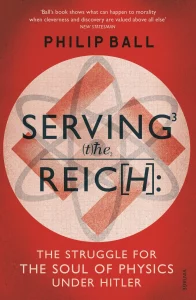
The Struggle for the Soule of Physics under Hitler.
What a fantastic book. A must read for every young scientist as it highlights the complexity of the ethical and political dimensions of research. Following the paths of Planck, Heisenberg but especially Debey through the rise of the Nazi regime through the war and finally its aftermath the book presents an extremely well balanced account of the ethical and moral dilemata faced by scientist in totalitarian regimes. The strength of the account lies in the fact that their struggles are presented with very little hindsight judgement but well contextualized with the circumstances of the time. Another strength of the book is that while contextualizing the decisions of these guys they are contrasted several times against those of others in the same time who showed that there were in fact alternative paths that were available at the time to people in the exact same circumstances. The book casts no judgement but presents these people as ordinary humans with all their flaws leaving the reader with all the ambiguity that comes with that. Exactly in this ambiguity lies one of the core lessons to me and a welcome change to the judgement loaded discourses of our current times. Most people are not good or bad, but they are flawed individuals acting within the circumstances of their time. I also like the case made in the end that it is not so much what people do in troubling circumstances that shows their character, but how they deal with their shortcommings afterwards.
One last thing to add is that the structural changes imposed by the nazis in German academia (especially the Führerprinzip) still leaves its traces until today. German academic cultur is to this day extremely hierarchical. At a Max Planck for example when a Director retires or resigns, all their staff with non permanent contracts are terminated, as goes the king so go his minions.
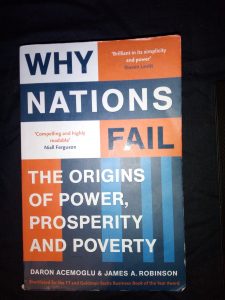 Though well written, if you’ve read Dictator’s Handbook before it reads a little lengthy at moments where mechanisms could be described much more concise. However over all it is still a good read. It works mostly anecdotal with case studies and puts more emphasis on the economical side of the politics-economy coin which is less expanded on in Dictator’s Handbook. Their focus of “prosperity” however is pretty narrow, as only really referencing GDP and focusing on creative destruction. Dictators handbook however takes into consideration how inclusive political institutions foster general wellbeing through a much broader spectrum of “good policies” that benefit the majority (such as i.e. construction regulations).
Though well written, if you’ve read Dictator’s Handbook before it reads a little lengthy at moments where mechanisms could be described much more concise. However over all it is still a good read. It works mostly anecdotal with case studies and puts more emphasis on the economical side of the politics-economy coin which is less expanded on in Dictator’s Handbook. Their focus of “prosperity” however is pretty narrow, as only really referencing GDP and focusing on creative destruction. Dictators handbook however takes into consideration how inclusive political institutions foster general wellbeing through a much broader spectrum of “good policies” that benefit the majority (such as i.e. construction regulations).
The vicious and virtuous circles are certainly well founded and I am not 100% on board with them that the. I am not 100% on board with them when it comes to the order of events that cause a switch from one to the other. They claim that institutional changes come first. However many of the examples could also be read differently. An unaccounted economic shift slowly changed the economic power distribution to a sufficient degree that upon a critical junction it could be turned into institutional power. The post WW2 transitions of Germany and Japan (and to a lesser degree Italy) are strangely absent from their treatment as far as I recall. In fact it seems that modern European history is largely absent from their analysis. I would still recommend it as supplementary literature to Dictator’s Handbook.
Capital – in the Twenty-First Century
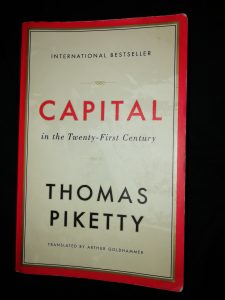 Before reading the book I had heard a lot about how leftist and anti capitalistic it is. And I was expecting another addition to the “Political and Religious Ideologies” section. However I was surprised to find a text that was largely focused on historic analysis of Capital and Capitalism in different countries and regions. It is very interesting how an analysis of the development of capital and the economy can lead to an understanding of where certain political movements (such as the conservative revolution in the US and the UK in the 80s) originated.
Before reading the book I had heard a lot about how leftist and anti capitalistic it is. And I was expecting another addition to the “Political and Religious Ideologies” section. However I was surprised to find a text that was largely focused on historic analysis of Capital and Capitalism in different countries and regions. It is very interesting how an analysis of the development of capital and the economy can lead to an understanding of where certain political movements (such as the conservative revolution in the US and the UK in the 80s) originated.
Over all he demonstrated how little we really know about the distribution of capital and the development thereof in the past, but in many places also still in the present. What the book managed to convince me of is in essence a triviality: for a democratic society to make informed decisions it is first and foremost important to collect and provide said information to the public in an accessible manner. Discussions about taxes, inequality and governmental spending are often based on gut feelings rather than facts.
Before we as a democratic society can decide which inequality we deem justified, we need to know, which inequality actually exists at present.
The last section has a slight ideological tan. The book as a whole however doesn’t really work as a bible for a new polito-economic ideology. For that it is written in a too sober and cautious/scientific style. It does serve however to debunk many polito-economic ideologies, mostly on the neo-liberal and neo-con spectrum.
The most important conclusion, on the more ideologically tanned side, that I find plausible at the very least, is that Europe’s nation states each by themselves are too small to exert effective democratic control over capital/ the economy in a globalized world.
As a side note: I really appreciate it that he brands himself (old-fashioned as he claims) as a political economists. It is exactly this connection between politics and economy that struck me as extremely sensible in Marx old texts and I think it is time for it to make a comeback. There is no such thing as politics without economy and economy without politics. At least not on the scales of societal interest. Also in the same spirit I like the statement that economy is no more or less a rigorous science than all the other disciplines of social science.
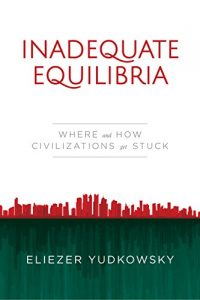 Ever felt like you want to change the world because it was so obviously disfunctional in certain parts? In that case you have probably ran into an inadequate equilibrium. The book is written in a very entertaining style and explains well how these situations actually occur. If a system is obviously disfunctional there is a high chance, that there exist secondary constrains that make it extremely difficult to change the system despite the obvious short comings. That is the basic idea behind the concept of inadequate equilibria. Especially worth to read for aspiring founders who want to make use of an obvious disfunctionality. Take a second look whether you have truly identified all constrains that force the system to the place it is currently at?
Ever felt like you want to change the world because it was so obviously disfunctional in certain parts? In that case you have probably ran into an inadequate equilibrium. The book is written in a very entertaining style and explains well how these situations actually occur. If a system is obviously disfunctional there is a high chance, that there exist secondary constrains that make it extremely difficult to change the system despite the obvious short comings. That is the basic idea behind the concept of inadequate equilibria. Especially worth to read for aspiring founders who want to make use of an obvious disfunctionality. Take a second look whether you have truly identified all constrains that force the system to the place it is currently at?
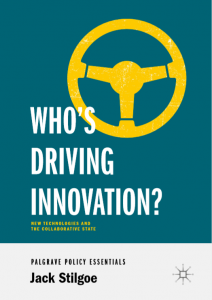 A fantastic book on the social and political aspects of technological progress. This book should be mandatory reading for bureaucrats, policy makers and entrepreneurs/innovators alike. The book asks simple yet central questions such as “who will benefit from this?” and it questions the self-serving Silicon Valley mantra that technological progress is inevitable by asking “what kind of technological progress do we want?”. Most importantly it advocates strongly to put technological innovation back under the control of governments and thus subject to the democratic deliberation process where everybody gets to shape the world they live in.
A fantastic book on the social and political aspects of technological progress. This book should be mandatory reading for bureaucrats, policy makers and entrepreneurs/innovators alike. The book asks simple yet central questions such as “who will benefit from this?” and it questions the self-serving Silicon Valley mantra that technological progress is inevitable by asking “what kind of technological progress do we want?”. Most importantly it advocates strongly to put technological innovation back under the control of governments and thus subject to the democratic deliberation process where everybody gets to shape the world they live in.
I also particularly like the parts about hypes in science. It is a phenomenon that I find very worrying regarding its potential to undermine the trust in science. I agree that this is largely due to current funding schemes that reward scientists for attention seeking behavior.
Over all this is clearly one of the books of the category: If they hadn’t been written somebody would have to write them.
How to Raise Successful People: Simple Lessons for Radical Results
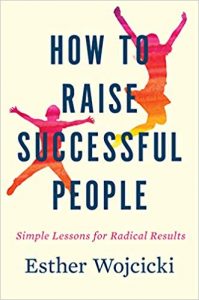 I met Esther Wojcicki at SciFoo 2019 where she organized a discussion session based on her book. It mostly turned into a lively discussion on the meaning of what defines a “successful person”. Given the setting at SciFoo this discussion was particularly interesting as most people present had been successful in their life in conventional terms, but the discussion ended up mostly criticizing conventional terms of success as good guidance for parenting. As a result of the intense discussion Esther didn’t get all too deep into her philosophy of parenting and hence I decided to read the book.
I met Esther Wojcicki at SciFoo 2019 where she organized a discussion session based on her book. It mostly turned into a lively discussion on the meaning of what defines a “successful person”. Given the setting at SciFoo this discussion was particularly interesting as most people present had been successful in their life in conventional terms, but the discussion ended up mostly criticizing conventional terms of success as good guidance for parenting. As a result of the intense discussion Esther didn’t get all too deep into her philosophy of parenting and hence I decided to read the book.
For most of it: I really really loved reading the book and I think it is a good basis for new parents to develop their own parenting style on top of it. But the book isn’t just for young parents. Everybody working with kids and teenagers can benefit from it and for me it was also an interesting opportunity to reflect on how I have been raised (a point Esther emphasises is that one should reflect deeply on one’s own upbringing when thinking about what kind of parent you want to be).
The basis of her parenting and teaching philosophy is summarized in a short acronyme:
TRICK. It stands for trust, respect, independence, collaboration and kindness.
When I grew up I did a high school exchange year in the US when I turned 17. What struck me the most (and what I struggled with the most during that year) was the amount of trust put in me and the amount of independence I was given by the grown ups in the US (particularly in school but not only) was substantially lower than what I experienced back home in Switzerland (almost to the point of non-existence in fact). In Switzerland I was part of an organizing team for a 2 weeks summer camp where the team was mostly between 16 and 20 and parents would send their kids aged 6-15 off with us for two week. Arriving in the US I felt like I was mostly treated like a baby again. I was not happy to say the least but it made me appreciate the freedom, and independence I had growing up in Switzerland.
That all being said, when she discusses the successes of her daughters she omits any critical comments on the way they conduct their business, which particularly for Youtube there would be a bunch of things to talk about.
But hey this is a parent’s perspective on their kids success after all, so this omission of the critical aspects about her daughters business conduct does not put a serious dent in the overall quality of the book, which again I really really enjoyed and I can thoroughly recommend everybody to read it.
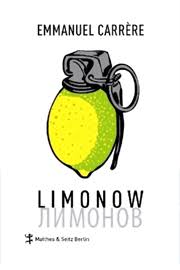 This one I have a split relationship with. As much as I can identify with certain parts of his life and character as much I disapprove some of the extremes he goes to. Still the interesting parts overweigh in my opinion as this crazy biography (Not sure how much can be verified) illuminates the Russian side of the occurrences in the 1990s.
This one I have a split relationship with. As much as I can identify with certain parts of his life and character as much I disapprove some of the extremes he goes to. Still the interesting parts overweigh in my opinion as this crazy biography (Not sure how much can be verified) illuminates the Russian side of the occurrences in the 1990s.
Political and Religious Ideologies
I was always interested in what makes the world and society tick. The project to read all important books of world history actually started with my final exams in highschool. We had to make a reading list for the oral exam and I wanted to throw a tantrum. For that I put “Mein Kampf” on the list with the intention that they would certainly force me to change it. Well they didn’t and so I actually had to read it. I started of with those books most relevant to the west and might soon look beyond.
Note: I’m obviously no expert on any of these topics and happy to learn if I am gravely mistaken in my analysis.
My ultimate goal is to understand society and ideology in the large scale.
One interesting observation I made is that the religious (old) texts are much more stable against perturbations then most modern proposal for organizational structures of society. Both the Quran and the Bible spend a lot of time on the failability of humans to reach a perfect society, where as the others, Atlas Shrugged in particular, impose a perfect society and then describe how it functions. So while all of them describe an Utopia of some sort, the religious texts actually acknowledge that we will never reach it because human nature is imperfect.
This stability to perturbations is probably the reason why these books are still today relevant for larger parts of society while the more modern ones live in smaller niches (for Mein Kampf that niche can’t be small enough for my taste).
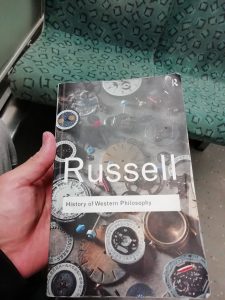
I received this book as a gift from my PhD advisor for my defense (Thanks Lars ^^). It is a long and dense read but well worth it. I was often surprised how far back in history many of the memes go that permeate western philosophy and culture. At times the personal preferences of Russell are too visible but given the sheer volume of intellectual history that had to be compressed into a manageable size that is ok. Also it is clearly visible, that the book is a product of its age. Finished towards the end of World War II it is itself a piece of history already. I wondered sometimes how Russel’s comments would have changed if he wrote the book today in the context of the modern philosopical environment and of course with having the advantage of the hindsight of the last 70 years after the war including the cold war and the fall of communism. Nevertheless I still consider it a worthwhile reading to get an overview of the history of western thought. One thing that struck me most is how essential the historical context is for the memes that emerge. Reading Russel’s account of that has me strongly favor the idea, that it is historic circumstances that shape historic thought and less historic thought that shaped historic circumstances. The political dominates the intellectual at most times.
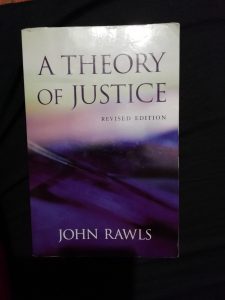
Justice as Fairness builds on the idea of a social contract. The most important tool for the argument is the veil of ignorance in the initial position. Members of a society have to agree on fundamental principles of justice without knowing anything about their personal preferences or standing in society. Based on that Rawls proposes two principles to be applied in lexical order:
1) Each person is to have an equal right to the most extensive scheme of equal basic liberties compatible with a similar scheme of liberties for others.
2) Social and economic inequalities are to be arranged so that they are both (a) reasonably expected to be to everyone’s advantage, and (b) attached to positions and offices open to all.
The core of the book is aimed to argue the superiority of justice as fairness above common alternatives such as perfectionism and various forms of utilitarianism. The one thing that made me the happiest, is the fact that he spends an extensive amount of thoughts on the question of stability. This sets “A Theory of Justice” apart from all the other more modern ideologies discussed in this list.
I would thus consider Justice as Fairness to be a good foundation to build a counternarrative to the prevailing neoliberal ideology today. The philosophical rigor of the argument makes the ideas in the book inaccessible to a broader audience. A narration focused on the application of the theory would be necessary to really spread the ideas.
In the following a couple excerpts that I found most remarkable:
On tolerating the intolerant (page 192 -193): “Knowing the inherent stability of a just constitution, members of a well-ordered society have the confidence to limit the freedom of the intolerant only in the special cases when it is necessary for preserving equal liberty itself.”
(page 325) “If a religion is denied its full expression, it is presumably because it is in violation of the equal liberties of others. In general the degree of tolerance accorded opposing moral conceptions depends upon the extent to which they can be allowed an equal place within a just system of liberty.”
(page 340) on civil disobedience “For example, suppose those who do not believe in toleration, and who would not tolerate others had they the power, wish to protest their lesser liberty by appealing to the sense of justice of the majority which holds the principle of equal liberty. While those who accept this principle should, tolerate the intolerant as far as the safety of free institutions permits, they are likely to resent being reminded of this duty by the intolerant who would, if positions were switched, establish their own domination. The majority is bound to feel that their allegiance to equal liberty is being exploited but others for unjust ends.”
On compliance: “Even with a sense of justice men’s compliance with a cooperative venture is predicated on the belief that others will do their part, citizen may be tempted to avoid making a contribution when they believe, or with reason suspect, that others are not making theirs” Hence the need for coercion when collecting contribution to joint ventures (i.e. taxes).
On the role of mutual respect (tying into the theme of “Identity” discussed below): “The duty to show a person the respect which is due to him as a moral being, that is as a being with a sense of justice and a conception of the good. Mutual respect is shown in several ways: in our willingness to see the situation of others from their point of view, from the perspective of their conception of their good, and in our being prepared to give reasons for our actions whenever the interests of others are materially affected.”
As I’ve seen people argue this way, I feel the need to remark this: Rawls explicitly states that Justice as Fairness says little or nothing about the relationship between humans and nature.
Bible and Quran
The Bible and the Quran I take here together because to me the most interesting thing is how they relate and how they differ. Note as I obviously just read the books and didn’t thoroughly study them, anything I write here is to be taken with a pinch of salt. I would rather consider them a list of hypothesis then definitive statements. The comments here are limited to those aspects i found the most noteworthy.
Since I lack the cultural background on the Quran I chose a heavily commented translation in the hope that it helps better understanding. (See link in the title)
Note that in the bible I consider the old and the new testament to be two separate books.
The first really interesting thing to observe is that of the three books the new testament stands out in respect that it is the only one where the core texts were not written during a period where the religion was a state religion. The old testament and the Quran clearly served as complementary tools to the political power as a mean to organize a complex society. The new testament largely lacks this attribute. (Which I assume is part of the reason that the canonical bible, which was assembled after Christianity became state religion, does contain the old testament. The new testament by itself would simply not serve as state religion.)
The three books clearly carry an imprint of their time ordering when it comes to legal and ethical questions. Primarily with respect to milder and milder retaliations for crimes and more forgiveness. From eye by eye to a rudimentary legal code (which the modern legal state can be considered the logical successor in my point of view). Here is in particular one observation with respect to the Islamic legal code and the modern discourse: If I read it correctly then there actually is a one way compatibility between the legal code in the Quran and todays western legal state. Namely the punishment that the Quran allows a victim to inflict about the offender is not formulated as a necessary punishment. Much more it is stated as the maximum retaliation you are allowed to take without committing a sin that would haunt you in the after life. However it is stated in at least one place, that if you forgive instead and choose a milder punishment you will be rewarded for that in the after life. Now since most of the punishments in western states today considers milder punishments I do not see how the western legal system would be incompatible with the Quran.
The two younger texts are mostly written as instructions for personal behavior/issues and personal salvation while the old testament is written for one particular tribe and mostly addresses collective issues.
Special remarks:
1)The old testament is extremely war and battle related. It spends an excessive amount of time on statements that should prevent soldiers from running away on the battle field. Thus increasing the chance of success for the troops that follow this code. Given the fact that according to the text it seems as if genocide on the male part of the population of the looser was rather common after battles of the time, male circumcision likely belongs to those measures as well. (If you fight there is a chance your side wins and you survive, if you run away and your side looses, they will be able to find you and identify you as part of the looser clan and kill you anyway… so fighting is the more likely way to survive)
2) The Quran is the most axiomatic and logically built of the three texts.
Axiom one: god exists and is just.
Axiom two: The after life exists and makes up the large part of your existence.
Gods justice then shows in your afterlife.
3) I was stunned how much of our everyday language (sayings in particular) do originate in the bible. A huge part of our language is penetrated by it and thus by the Christian tradition.
Remembering the Present: Mindfulness in Buddhist Asia
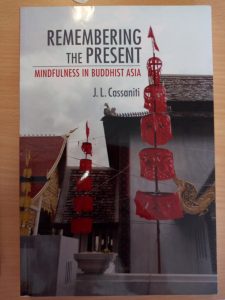
Technically this book doesn’t quite fit into the category here as it isn’t so much concerned about the ideology or religion but more about a concept, that of mindfulness, and how it is lived and interpreted in practice in different regions.
The reason why I decided to sort it in here lies in the section on how mindfulness has been used in the context of political power in Thailand during the military coups. It shows how religion always forms a symbiosis with political power. Namely it often provides one of the cornerstones of any organized society (especially in the context of autocratic regimes) to make sure that the vast part of society for most of the time accept their place in society. There is a lot of emphasis on that point in both the bible and the Quran as well. The more modern ideologies discussed below do not hit on that point and thus lack an essential element for a functioning society (however they weren’t necessarily intended to be such a fundamental building block to the framework of society).
On the book itself: As I have been meditating now for about a year it was really interesting to read about the cultural context where meditation is most commonly performed. Seeing the different connotation the same techniques/ideas can have in different regions definitely helps to sharpen what mindfulness means to me and what aspects of it are most relevant to me.
Mein Kampf
This one is on purpose not linked. If you really want to read it you have to do a minimum amount of effort.
Also I advise anybody willing to read it to make sure they have a rather good background in German and European history between roughly 1850-1920 but especially Germany during and after the first World War.
Then here comes one of the main points: It is often claimed, that the book is written badly. I would strongly contradict that. Of course it is not a linguistic master piece but it satisfies the purpose it was written for to a high degree.
Its purpose is deception, ideology and propaganda. It is particularly noteworthy how he treats the Judenfrage (Jewish question). It starts of with a general analysis of problems in German post war society (the socialist part in “National socialist”) . Which from a modern point of view a lot of people would actually support. Ideas like that a fulltime job should allow you to support a family for example. However within the discussion of such social problems he ever here and there slips in a comment, that it is all the Jews fault. In the beginning those are rather occasional but the further in the more frequent it gets until the build up finally culminates in the “Rassenlehre” (the race ideology).
Similar things he does with the German defeat in World War I ( Dolchstosslegende – back stabbing legend). Same accounts for the general build up of the book. From sane to insane. From addressing legitimate problems to going batshit crazy.
All together it takes a solid background knowledge and an alert mind to read the book so you can remind yourself of reality whenever you start thinking “actually this guy makes kinda sense”. No he doesn’t, simply not. But it is tricky at points to keep that in mind.
I placed this very deliberately right next to Mein Kampf. While it lacks the blunt racism and antisemitism of the latter it is squarely in the domain of “ideologisches Machwerk” (done’t know how to translate this one, “ideological concoction” might come close). As for Mein Kampf you need to read it with an alert mind and substantial background knowledge to spot all the ideological twisting that is going on. One example of the bat: when calculating the lifetime costs of taxes they assume a interest rate of 20% per year. Piketty has analysed the return on investment for US Universities: over the longterm only the biggest endowments reached 10% per year. Smaller ones were somewhere around 5%. Now when doing a quick back of the envelop calculation reducing the interest rate from 20% to 5% per year turns their 40-50mio live time costs of taxes to 1-2mio. That is a totally different scale compared with what one arguably gets in return for taxes. Similarly of course they only see one way out for the increased bargaining power of corporations against nation states: for democracies to give in and states to focus solemnly on making corporations/rich people happy. This misses the obvious alternative: for nation states to coordinate with each others to use the sheer size of their consumer market as a counter weight against the increased bargaining power of corporations.
Brexit is the poster child of the ideology presented in this book. It is likely no coincidence that Rees-Mogg junior was a leading figure in the Brexit movement. Whether it ultimately turns out to have been a positive decision for British citizens remains to be seen but with current developments there are a lot of reasons to believe that this is not the case. In the meantime the EU has prooven rather successfull in reigning in even the biggest tech companies and has become a regulatory super power. Also it is rightfully noted in the foreword that China defies about every single argument made in the book.
Now the place next to Mein Kampf is not just due to its ideological nature but also the structure of how the attack against the democratic nation states and its social security system is built up through the course of the book reminded me a lot of how antisemitic tropes are introduced in Mein Kampf. Despite these points the book was worth reading, if not alone to know understand the arguments that are building up in the tech world against social security in democratic nation states.
Now finally to some worthwhile insights: the thesis, that the means of violent conflict have a strong influence on the social structures of our societies seems correct. The currently ongoing invasion of Russia in Ukraine puts their thesis about the development of modern conflicts in the gray zone. On the one hand relatively cheap systems that are easy to operate (Javelin, drones,…) have proven very effective in this war. These definitely turn the economic balance in favoure of the defender. However the fact that it takes all of the west combined to supply the war efforts of a single country in a full scale war contradicts their hypothesis. Furthermore they do not even touch to what extent the government can provide security in the digital space. This will become an interesting field to watch as here attacks from countries on the other side of the world. It remains to be seen whether contries will invest in some collective security efforts in the digital space.
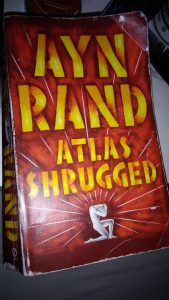 1) There have only been few books I had a similar struggle with as with “Atlas Shrugged”. In fact the only other book I had a similar experience with was “Mein Kampf” and I would put them on a similar level as far as radical ideologies go. In both books there are a large number of very reasonable logical statements and they are both quite deceptive, especially when you are/think you are part of the population that would benefit from these ideologies. Only once you look at the whole picture and follow the argument through to the bitter end you can see how inhuman both ideologies are.
1) There have only been few books I had a similar struggle with as with “Atlas Shrugged”. In fact the only other book I had a similar experience with was “Mein Kampf” and I would put them on a similar level as far as radical ideologies go. In both books there are a large number of very reasonable logical statements and they are both quite deceptive, especially when you are/think you are part of the population that would benefit from these ideologies. Only once you look at the whole picture and follow the argument through to the bitter end you can see how inhuman both ideologies are.
2) I have to admit that if i would have read the book 10 years ago it would have been pure poison and I’d have been sold on it instantly because I know many of the sentiments portrayed in the main characters quite well.
3) I was surprised how much of the neoliberal rhetoric still used today is present/originates from this book. Indeed the book does provide a strong narrative to support neoliberal policies. Since the fall of communism there is a shortage on compelling alternative narratives in the political landscape I think.
John Galt
There is no debate over reason
There is only fellowship or treason
What a bold claim it is
That a rational analysis
Of the chaos that s society
Would only permit
One single bit
One single propriety
With such a narrow field of vision
Despite dispise of superstition
One is prone to make conclusions
That won’t withstand intrusion
Of the worlds reality
Of the real stand of things
Into ones ideal world
Into ones illusion
John Galt is an imaginary figure
There is simply not one soul
in this world
Equivalent in goal
In this world
Every invention every trigger
That has ever been conceived
With its inventor removed from history
Would most likely been achieved
A little later, that’s no mystery
By someone else
By another mean
But the large scheme
Would not have changed in this mess
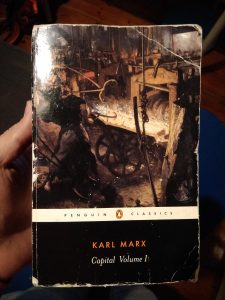 The book is well written and should be standard literature for any student of economics. Not necessarily because it is right but mainly because it demonstrates that by looking at a complicated phenomenon from a completely different angle you can come up with a (mostly) consistent description that is entirely different from the dominating narrative. The books has its strength in the places where Marx mainly acts as an observer.
The book is well written and should be standard literature for any student of economics. Not necessarily because it is right but mainly because it demonstrates that by looking at a complicated phenomenon from a completely different angle you can come up with a (mostly) consistent description that is entirely different from the dominating narrative. The books has its strength in the places where Marx mainly acts as an observer.
His foundational analysis has one central flaw though, which he tries to argue away in depth however doesn’t manage to do so in a really convincing manner. The central flaw starts with his definition of money, stating (I think correctly) that there can only be one commodity that fundamentally acts as money. In essence saying there exists only one reference frame for relative exchange values. He then more or less argues that the price of everything is defined by the amount of socially necessary labor embodies in it, and hence labor possesses the characteristic of money. The fundamental break then happens when he introduces the idea of surplus labor and argues that even though the price of everything is measured by the labor embodied in it, this is not true for labor itself. Which is essentially saying that you can exchange everything for a relative amount of gold but if you exchange gold for gold you get back less if you are the original producer of it. This makes of course no sense. He then tries to argue on pages over pages why exactly his fundamental axiom that the price of everything is determined by the amount of labor embodied within it is true for everything except naked pure labor itself. He gets into complicated arguments between use value and exchange value… essentially invoking market arguments. It is important to note that this flaw in the argument sits so deep at the bottom of everything that it is essentially irreparable. As hinted to above that though doesn’t mean that this should be basis to dismiss all the other statements in his book. It just means that his interpretation of the underlying mechanisms has to be taken with a grain of salt.
At some point he jokes at the fact that capitalists hail the free market while within their factories they would organize everything within minute detail. There Marx obviously lacks understanding of the role of complexity. It is pretty simple to understand that there exists a threshold of complexity below which a central planning and organization obtains maximum efficiency while above that threshold you need some sort of self organization scheme to obtain a certain degree of efficiency (see Inadequate Equilibrium why free markets do not necessarily attain a global maximum of efficiency but quite certainly a local one). It is exactly this point where all implementations of communism have failed miserably. Maybe technology will one day allow us to push this threshold of complexity beyond the scale of human society however I highly doubt that. In this light any alternative to capitalism has to come up with a self organizing scheme which will be pretty similar to what we call “the free market”. Alternatively one would need to starve out innovation which would make such a system necessarily inferior to a market driven Ansatz.
His lack of understanding of the role of complexity also shows in the fact that Marx never even mentions once how the “socially necessary” amount of labor needed for a product should be determined outside of the market setting.
On the plus side Marx makes some remarkable predictions where he extrapolates on his observations such as the ongoing and intensified accumulation of capital. He also predicts correctly that the skills of a worker will become all the quicker redundant. Which is pretty accurate given the recent development from lifetime jobs to lifelong learning.
 Despite the time it was written the thoughts put down by Adam Smith probably still constitute the seed of most of our ways about thinking about economic interactions to this days. One of the most interesting points to me is the insight, that the money price of things has absolutely no independent meaning. The only thing that matters is how much goods an average day of labor can buy you. The wealth of a nation in Smith point of view can be determined by how many “unproductive hands” (read servants, military, bureaucrats) a country can sustain without economic decline. For me however I would prefer a notion of a nations wealth based on the amount of goods an average worker can purchase with his labor.
Despite the time it was written the thoughts put down by Adam Smith probably still constitute the seed of most of our ways about thinking about economic interactions to this days. One of the most interesting points to me is the insight, that the money price of things has absolutely no independent meaning. The only thing that matters is how much goods an average day of labor can buy you. The wealth of a nation in Smith point of view can be determined by how many “unproductive hands” (read servants, military, bureaucrats) a country can sustain without economic decline. For me however I would prefer a notion of a nations wealth based on the amount of goods an average worker can purchase with his labor.
One place that made me chuckle was Smith description of the resistance to free movement in Britain at the onset of industrialization. Notably he attributes the resentment to the existence of rudimentary institutions of a welfare state. People are worried they will have to sustain not only the competition by the immigrating workforce but also the livelihood of the immigrants if they fail to be productive. These (contradicting) fears are still today the main drivers behind anti immigration sentiments in Europe.
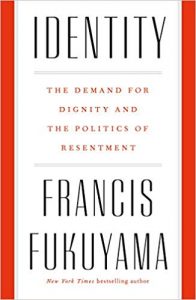 The book has earned its place in the politics and religion section mostly for the religious aspects of identity politics. In my personal opinion its extreme interpretations are essentially fascist and as dangerous to democracy as the racism and discrimination it claims to fight.
The book has earned its place in the politics and religion section mostly for the religious aspects of identity politics. In my personal opinion its extreme interpretations are essentially fascist and as dangerous to democracy as the racism and discrimination it claims to fight.
The book discusses the emergence of the current form of identity politics seen most strongly in the US but also spilling over to Europe recently. The book has its strength in the historic sections where he discusses how different aspects of personal and plural identities started to play an ever increasing role in the arena of politics. It is clear that identity and dignity in identity as a political force is here to stay. However I fully agree with the author that identity politics as currently understood on the left, diversity for the sake of diversity catering to ever smaller and smaller special interest groups, putting lived experiences over objective reality is a substantial danger to the fabric of society. No society ever sustained without a unifying narrative. The weak points come where the author asserts a neoliberal narrative as objective facts. (“The left in Europe had to understand that an ever increasing welfare state cannot be financed”. This is a result of neoliberal policies not a fact of nature. More so, redistribution and inequality as a political topic has not ceased to exist, on the contrary it would be more urgently needed then in the decades before, see the “capital in the twenty first century” above for a discussion).
What, as a Swiss, I find strange is how he completely misses out on the curious case of the Swiss national identity (which validates some and invalidates others of his suggestion for a European way forward). Switzerland was multicultural in the very sense already in a time when ethno-nationalism swept the continent. The main achievement of Switzerland during the two world wars wasn’t so much its preservation of sovereignty towards the outside, but the fact that it managed to preserve internal unity. This is coined in the phrase “geistige Landesverteidigung” which in the context of identity politics can be translated to “defense of national identity”. No little feat in a climate where the ethnic relatives across the boarders are entrenched in a deadly war.
His suggestions of how to introduce a European passport is very much invalidated by the history of citizenship in Switzerland. To this day, citizenship in Switzerland is tied to a particular village and identities have a strong regional tan. The last practical implication of the village based citizenship was only removed in 2017. Notably more than 100 years after free movement between Swiss villages became a reality. This didn’t cause a problem with national identity during the war.
On the other hand it is indeed true that the common national service (i.e. military conscription to this day) does play a significant role in forging the national identity. For many men in Switzerland the military is the only place where they experience prolonged contact with the other national languages (which does not go without significant friction. The most dangerous thing in the Swiss military today is a soccer/football game between a French speaking platoon and a German speaking platoon). Also wherever I go in Switzerland, if I don’t know anybody, I will always be able to talk about the shit that happened in the military and many guys will join in the conversations with their own stories. Long story short: conscription service does contribute substantially to national cohesion in Switzerland.
Last but not least: The new nationalistic wave has started in Switzerland already in the 1990s. On the other hand in 2014 around the campaign organization Operation Libero a new narrative emerged propagating the sort of inclusive, value based understanding of Swiss national identity proposed by the author.
The book addresses fundamental misconceptions in our economic thinking and thus our economic models. It has its strong suit where it points out the shortcomings of established conventional economic thinking and how it obstructs the design of a society that can live within the planetary limits. GDP growth per se is a bad proxy for the economic healthy of a society and we need better metrics. So far so good. It should also be self evident, that we can not continue to use ever more resources as our planet is finite.
However, when the book gets to possible solutions the ideas presented did not strike me as particularly convincing, at times even contradicting. For example: On the one hand it is argued that putting a monetary premium on socially desirable behavior leads to less intrinsic motivation for said behavior so this is supposedly bad. On the other hand it is argued that we should design complementary local currencies that should provide access to certain desired resources only in exchange for desired behavior.
Overall I would say it is a worthwhile read as it challenges the orthodoxy of economics. That by itself is an important first step towards better economic modelling. However for me personally I haven’t found a convincing solutions as to where we will find such better models. But to be fair that would be asking too much from one single book.
Others
When the Bible talks about Jesus, except for a few stories around his birth, the texts are only concerned about his adult life. In this book Christopher Moore makes a suggestion of how the time in between could have looked like (if it weren’t polished by religious gate keepers that try to preserve an ideal picture of their icon). Personally I found it quite an entertaining read. I mean have you ever thought about how one becomes a messiahs? That is quite a tall order to start with and as the book suggests you certainly need to have a good friend on your side.
A neat little fictitious novella that vividly depicts the the effects of psychological torture inflicted on the main character during his imprisonment during the nazi occupation of Austria. It illustrates the problem of a coping mechanism that overshoots due to the necessity of the moment and the PTSD it can trigger when deployed years down the path.
Plagues and the Paradox of Progress
A really important book on the state of the health of the world. It picks up on the same theme as “Factfullness” but provides a more in-depth focus on health and the challenges in the developing world. The positive message first: The world is getting healthier and people are living longer. The worrisome message: the gain in life expectancy in (cities in) developing nations is not accompanied by the same development of institutional structures as it was the case in western Europe and the US. I.e. most of the increase in life expectancy is due to technical advancements (vaccinations) rather than institutional advancement (better sanitation and general infrastructure). This leads to a new phenomenon with new challenges: poor mega cities.
On the other hand, with infectious diseases more or less under control, non-communicable diseases gain in relevant (heart diseases, cancer, obesity, diabetes). Together this leads to the conclusion that if we are to further improve global health, the strategies of the past decades are insufficient. Non-communicable diseases can not be treated by intervention programs but require local competence building, infrastructure and long term investment.
Can you cover 67 years of history of an entire continent in one book? Even more so when the continent has been divided for about half that period? The challenge Ian Kershaw set himself when writing this book was certainly formidable. The result is a pretty good overview of the main political and sociological currents that shaped Europe in the time since the second world war. Given the immense amount of material that has to fit in relatively little space these developments are painted in rather broad strokes. To me it makes the impression that the selection of events and materials covered give a fair representation of the relative importance of events. The strongest parts in my opinion are those where he focuses on the history as lived by the common people and how this diverged from the history memory of the intelligentsia. Constant threat of nuclear Armageddon? Not so much a concern for the common people all to busy living their lives enjoying the material benefits of the period. This also fits the fact that most major changes in the political landscapes of countries happened over everyday domestic issues rather than big ideological questions. If the economy is good people are happy and reelect the government no matter what the policies employed. If the economy goes bad it basically doesn’t matter how skillfully the crisis is handled by the party in power, they are doomed to get booted in the next election.
Big movements such as the student movement in 68 also turn out in hindsight to have left a bigger dent in the collective memory then in actual policy changes. He works out in detail how the movements essentially failed in every country to amass anything that would be close enough to majority support in turn to drive actual change. On this backdrop I was surprised that the Vote on the new ETH law in Switzerland in 69 (Historical account only in German) did not qualify for a mention in the book as it was apparently one of the only occasions where the students managed to get the backing of a majority of the population for their support.
Disclaimer: Ok I admit here some personal bias as I spend a substantial amount of my student days working for VSETH among other things as organizer of the 150. anniversary. It came as a surprise to me, when I realized when reading the present book, that the plebiscitary success by VSETH against all political parties was actually an exception in the greater European context, as I had always heard of the radical change that came from the 68 movement.
It is to be noted though, that also in Switzerland, despite the plebiscitary success, the long term policy change achieved was meager, as the political establishment just threw the students in the institutional slow grinder and eventually in 1991 passed an almost identical law to the one denied by the people in 1969.
The book shines light on the relationship between our species and other species living on this beautiful planet. The core argument is based on the idea, that equal consideration should be applied to all species based on their capacity to suffer.
The central strength of the book is, that its arguments and accounts are presented on an absolutely level headed, calm rational manner. It avoids the moralism and alarmism that is common to that genre of literature. In fact his strongest rhetorical tool is to let the other side describe the circumstances which he rallies against. So at no point is he in danger to be accused of exaggeration.
I started reading the book because of a discussion concerning a proposal for a new aquarium in Basel. I am still supporting that project and in fact I think for most species these arguments wouldn’t be strong.
However, I got convinced that current industrial farming is incompatible with a consistent moral code and despite the fact that I absolutely love meat, I will change my diet to be as vegetarian as possible (while allowing for the occasional meat fest). Though I have to admit that climate change and world food supply aspects are the stronger motivation for me than an opposition to speciesism.
Everybody should read this book. The central aspect I see in it for men is to understand the effect of repeated low level sexism. That when you see a woman snap for something “minor” it is quite likely that this is the 10. time she heard a “minor” thing lately. For women the main benefit is to understand that you are not alone and that you should never just accept things.
I appreciated the fact that it also included a section on men that are on the receiving end of sexism. After all if we want to solve sexism we are only doing a good job if we unite all the people suffering instead of staking them against each other.
Pretty entertaining instruction manual for sex, aimed at guys. (Like actual instructions, not bad porn). Props for the looks it earns you when you read it in public. Some of the romancing part seems rather old fashioned but I guess a matter of taste is a matter of taste. If you like sex and care about the people you have sex with, then this is a good source for inspiration.
There is a version aimed at women too.
An Essay on Science and Narcissism
A fascinating inside analysis into the role of narcissism in (life) science. That I read with great interest. In November 2017 I was at the Falling Walls Circle in Berlin. Topic that year was alternative facts and the loss of trust in science by society.
I attended the discussion about the internal working of science and a lot of the issues that were brought up there are reflected in the book (which unfortunately I only read thereafter). Essentially the discussion went in circles. “Nobody likes to invest a lot of time into peer review” “well it doesn’t help career advance” “there should be a way to acknowledge this work”…. “nobody likes to invest time into writing review articles of the state of the art” “well it doesn’t help career advance”, “there should be a way to acknowledge this work”… the same pattern repeating with a whole set of topics including science communication, hiring committees, evaluation committees and so on and so forth. Essentially summarizing into: nobody wants to do the community work that keeps the system running, except a bunch of idealists, while the narcissists flower by taking advantage of free lunch.
I think if one tries to change the system the vulnerable narcists (or some flavors thereof) could actually play an important role. They can play the current system and succeed in it yet they are more dependent on social interactions and might be more willing to actually adjust the system. (Also i think this flavor of narcists is much more common in math, physics and computer science.) Generally I think exploring the (possible) role of this breed of narcists more in depth would be worth while.
(as an aside: I think the Steppenwolf gives a good characterization of a vulnerable narcissist.)
The book gives an interesting window into the thoughts and ideas around the stoic philosophy. I quite like the stoics approach to life. And I would put one of my favorite life lessons roughly in that ball pit:
There is only three things you have to learn in life: strength, patience and wisdom.
Strength, to change the things you can change.
Patience, to accept those things you can’t change.
Wisdom, to tell the difference between the two.
The Four Socratic Dialogues of Plato
The dialoges enlighten the Socratic philosophy quite well. What I like about its nature is that in the dialogue the philosophical insight is not provided by the teacher through lecture, but by the student through answering the questions. One of my favorite ways of teaching, leading a student to discover the answer with clever questions. (But also one of my favorite techniques to drive extremists of all sorts crazy in discussions, using questions to lead them in a circle until you are at point where you can be: “So what now? A or not A? Both can’t be true at the same time!”)
Conflict Is Not Abuse: Overstating Harm, Community Responsibility, and the Duty of Repair
In the introduction Schulman writes: “My considerations are broad. […] These chapters are not homogenous. […] Each chapter here serves a different function and that is represented in its tone, genre, style, and form. Some are journalistic, some analytical, some are speculative, others abstract, some are only feelings.” That is not an understatement. in contrast to most non-fiction books it is less of aseries of arguments leading the reader to a conclusion rather than a more or less ordered assembly of thoughty circling around the topic of the title. Accordingly I can not give you a suitable summary of the book as reading it amounts to a kind of Rorschachtest: what one finds valuable depends strongly on the personal context. To me the part about interpersonal relationships was crucial, while still recovering from a very toxic relationship. It helped to counter my demonization of actors in my own story and see them for the people with (strong) limitations they are. In that context though I disagree at one point: it is completely ok to stop talking to somebody once you decide that you do not want to have a particular relationship in your life anymore. There is no duty to accomodate everyone in your life. Some people had their chance and it is fine to move on.
When I first heard of Holacracy at a StartUp event in Berlin I first thought “Ah just another StartUp hipster fad” (which is all too common in Berlin). But I decided to have a look at it nevertheless. My first skepticism was quickly overcome by the fact that it satisfies the basic principles that I was looking for for an organizational structure for our StartUp: distributed authority, empowering the individual employee, distributed responsibility, you can decide things but then you are also responsible, and most importantly a mechanism to resolve tensions. If there is a process inside the company that hinders you from fulfilling your role, there is a predesigned path for you to address them. Most importantly though it approaches company structures from an evolutionary and dynamical point of view. It does away with the idea of static organizational structures that are then transformed into other static organizational structures through reorganization programs. Rather it views organizational structures as dynamical entities and provides a meta structure that ensures order despite an ever changing structure.
It is a very interesting book that should be on the reading list of every aspiring entrepreneur. It puts strong emphasis on the importance of the business idea. And emphasizing that you should not try to do everything in your (small and young) company yourself, when all the necessary components exist as services. Thus you can reduce your need for capital and start making turn over right from the start. It is not the path that we choose to go because we are focusing on a technology driven approach however it is good to keep it in the back of your mind even in that setting. There is no merit in doing everything yourself, focus on the part you are really good at.
A very entertaining book describing the inside working of research in theoretical physics and how it diverges from the idealized scientific process, especially in string theory. Though I’m skeptical whether the author practices what he preaches with respect to openness for alternative approaches. This skepticism is partially based on the fact that he doesn’t even bother mentioning the following article by Erik Curiel that covers about 90% of the core points in the book (though being academic in nature, without the anecdotal pieces that make the book entertaining):
Curiel, Erik. “Against the excesses of quantum gravity: A plea for modesty.” Philosophy of Science 68, no. S3 (2001): S424-S441.
The most valuable part to me seems the list of criteria for a full theory of quantum gravity. Given the lack of experimental evidence that requires a quantum theory of gravity (or that violates the standard model or general relativity). The theoretical community should spend more time thinking about what a model should satisfy to be taken into consideration instead of simply shutting up and calculating.
Hossenfelder gives a very critical analysis of the state of fundamental theoretical physics today. Little progress has happened in the last 40 years and I think that she is correct to largely assign it to sociological aspects of the field as well as bad non-empirical guiding principles in the absence of data conflicting with out current best theories.
I do share a lot of the sentiments about modern physics presented in the book, and it was in fact that very situation that drove me away from theoretical physics towards mathematical physics.
In some parts she seems to go over the top. I have seen arguments, that naturalness can be thought of as a quantitative version of Occam’s Razzor in the setting of Bayesian probability. Contrary to her position, that would of course render it a perfectly fine criterion for theory assessment (given otherwise equivalent fit to data). However I have to admit that I am not familiar enough with these arguments to make a judgement call in either direction.
Overall the book is pretty entertaining and well written. It would be desirable to get an actual conversation going in the community.
Einstein’s Unfinished Revolution
In his new book Smolin introduces the reader to quantum mechanics and all its weirdness. Well actually, he spends a great deal of time explaining, why after all quantum mechanics isn’t quite all that weird, as people would make you believe. His writing is as usually entertaining and well referenced. He goes through many different approaches and discusses their history, advantages and short-comings. He also shows the sociological mechanisms at work in the scientific establishment. For anybody not involved in academia this might be a relevant insight. After all, science is done by humans and we all to often tend to forget that when we are discussing scientific results.
My general sympathy for the book is of course connected to my personal bias as I’m a realist myself.
Unfortunately Smolin seems to be unaware of Fröhlich’s ETH approach to quantum mechanics, which is both realist and as far as I can tell not plagues by the same issues as other realist approaches. Further more, and this is the biggest issue I have with interpretations of quantum mechanics in general:
He does not address the fact that most approaches muse about the interpretation of quantum mechanics, when the real issue would in fact be to think about quantum field theory. This is in fact particularly an issue for Bohmian mechanics from my point of view:
Suppose an atom absorbs a high energy photon and then decays back into the ground state in two steps, thereby releasing two photons which combined have the energy of the original incoming photon. How do you describe that in Bohmian mechanics? personally I don’t see a satisfactory answer to this question.
However the lack of covering QFT is not exclusive to Bohmian mechanics. It plagues most approach. Fröhlich’s ETH approach however, covers this as far as I can tell.
In fact from what I can tell so far, Fröhlich’s approach is a realist version of many-worlds. It is really unfortunate that Smolin seems to be unaware of Fröhlich’s approach, as his approach, which he presents in the last chapter, seems not entirely incompatible with Fröhlich’s work. However as I haven’t read into the scientific literature I can not give a qualified judgement on this.
This biography of Albert Einstein focuses mostly on his scientific life while also covering important private events in his life. I received it as a gift from the Albert Einstein Institute for the defense of my PhD thesis. As should be apparent from the rest of my website I was and still am mostly focusing on aspects of general relativity. GR is in and of itself a master piece in 20th century physics however the book reminded me in how many of the revolutionary developments in physics in the early 20th century Einstein was actually involved in. From settling the debate over the existence of atoms, to the foundations of quantum theory and finally general relativity. It is easy to underestimate the sheer magnitude of Einstein’s legacy. This biography helps to put it into perspective. However it was also interesting to see how in his later days his ventures towards a unified theory were unsuccessful.
Most popular science books have focus on the results of research. Here however Kirshner tells the story of how science is made. Quirky characters one meets along the way. Long nights of observations. Countless hours of data crunching. The excitement and tension when the data analysis turns out something interesting. Is this real? Are we just fooling ourselves? Do we trust our analysis enough to make a big announcement? It is these peaks into the often hidden research life that makes this book a really enjoyable read. Of course along the way one also learns a lot about the universe and how our understanding of the cosmos developed as this is necessary “background” information for this tale of discovery.
Personally, I really like this peak behind the scene, as it shows the human nature of science in many of its facettes.
A well balanced biography of a person who was as much a pop-icon as he was a scientist. While his scientific contributions were undoubtedly significant his pop cultural status always semed a bit overblown in comparison to some of his peers, most notably Roger Penrose. This being said, the biography manages a carefull balance between the two aspects of his life, his scientific achievements on one hand and his pop cultural role on the other. It also highlights how his illness partially drove his hunt for the spotlight, as his medical care was by no means cheap. If you want to read a critical review of Hawkings life an scientific contribution then this is the biography for you.
The following quote from the book best describes it best: “Subjectivity and emotional investment remain important, both in how scientists conceive creative ideas and in how others contest or accept these ideas. Science has always been an activity suffused with personal passion and wonder, and this has not changed. Contrary to the image of science as a methodology to extract fixed truths from nature, I have tried to show that it is dynamic and provides only a current map forward – and that map is inherently provisional.”
It is a great story about how our understanding of the universe developed including a lot of material on the sociological component. A neat plus is that given Natarajan’s background the historical context goes beyond the developments in Europe.
Overall a great book about both the science and sociology of our understanding of the cosmos.
Written in 1895 this book reads like a prophecy on the events that were to unfold in the beginning of the 20th century. However sometimes while reading I inevitably had to think of todays America under Trump.
One interesting point he makes (that I think holds true when I compare my experience in the Swiss military to that in academia) is that as soon as a group of people becomes large enough that group behavior starts to dominate, the qualification/intelligence of the individuals that form the group, become irrelevant. In combination with the analysis in Dictators Handbook (see above)this turns into a strong argument against any sort of meritocratic democracy.
If you have read Dictator’s Handbook (discussed above) and Psychologie der Massen, then you will understand why I think this is by far the worst book on this list. What annoyed me most is that it is intrinsically inconsistent. The argument that democracy does not empower the individual because a single vote doesn’t change an election is pretty basic. However, there easily exist more combinations of political group attributes (age, gender, ethnicity, income, wealth, education, location…) than people even in India. So it is almost impossible to remove a subset of the electorate without changing the balance between any of these potential group interests. Worst of all is that he actually advocates to disproportionaltely eliminate uneducated (read: poor) people from the electorate… which coincidentally eliminates a quite relevant political group interest and takes away agency from the already disadvantaged. Funny enough the system we already have in place (especially in the US) is heavily geared towards the interests of the wealthy and there is a (supposedly) meritocratic veto body of the inteligensia (i.e. the Supreme Court). Having grwon up in Switzerland I much prefer the
An interesting historical perspective on how the current political dead lock in the American two party system developed. After eras where one party used to dominate for decades no party was able to win more than 3 consecutive presidential elections in the past 50 years. The most interesting thing is the analysis of the important voter groups and how they can be forged into winning alliances. As of today much of the analysis remains valid as it seems that no party has yet managed to break the dead lock. In fact the years since publication have played out pretty much along the battle lines pointed out in the book.
An interesting read about the history and makup of polarization in american politics and society. It gives a clear description of the different dimensions of identity relevent to contemporart American (political) life. Also more importantly it explains the different identity alliances that make up the electorate of the Democrats and Republicans explaining the different limitations to their political maneuvarability and the different avenues to political success available to them. A good read for any US politics junky as it goes beyond just skin deep into the current political moment in American history.
The False Promise of Liberal Order
While the realist school of international relations has prooven their lack of connection to the real world in the wake of Russia’s invasion of Ukraine, the book still contains some valid criticism of the America led world order established after 1990. Where he has a point is that liberal order is a misnomer, as an order can never be imposed by liberal means. What liberal order meant, was that the liberal states, especially the US, were getting their way on most things that matter internationally.
Mostly anecdotal underlined with statistical evidence. The core strength of the book though lies in the fact that is anecdotal in a good way. It is not driven by ideology but portrays the life’s and the struggles of working poor in America. Showing that in reality neither the rightwing picture of lazy welfare queens and kings nor the leftwing picture of innocent victims of the system gives an adequate account on the situation of the working poor in America. The cases selected for portray in the book cover the entire scale between these two extremes. Thereby demonstrating that the story of poverty can’t be broken down to one single simple narrative. Good read both for people on the left and right.
A book which at times reads like a prophecy. Written in summer 2018 with statements such as “Otherwise, we court any number of avoidable disasters, after which we will inevitably turn, as we did after WW II, to experts to reconstruct our health, our economy, and the global order. The path that only takes us back to a respect for knowledge and ability through some sort of conflagration, however is too dangerous a risk. (In the wake of a global pandemic or a nuclear conflict there may be no path left at all.) I can only hope we recover our senses before then.”
Well unfortunately as it turns out we haven’t recovered our senses before the pandemic struck and we see thousands of needless deaths all over the world. First due to to governments acting too slow and later in many places through the outright refusal to get vaccinated by a substantial part of the population.
While a substantial part of the analysis is very specific to the US/Anglo-Saxon parts of the world (pay to play education for example. Reading that chapter reminded me of a quip by a former vice president of ETH Zurich in a lecture: “I like low tuition fees, it allows me to fail students.”) many of the same symptoms also appear in European societies. As the pandemic demonstrated brutally, too much desinformation and a lack of trust in expertise literarlly kills people. Accordingly it is one of the most pressing Problems of our time to reestablish trust in expertise.
Very American advice book. The first third or so you can ignore for good as it is just a sales pitch on how great the system is he is going to introduce to you further down the road.
When he gets to the actual meat the book often just presents the bare back bone without much practical advice on how to do it. A pretty obvious sales trick as he then offers installation guides and consulting services on his homepage. A pretty interesting application of the standard lock in trick. Nevertheless I did set up a system along the lines described in the book and it does help to make my life less stressful.
Ein Führer für Schematherapien der sich an Patienten richtet. Für mich war das Buch extrem hilfreich als Begleitung zur Selbstanalyse. Gerade in Lebenskriesen, wenn man alles in Frage stellt kann ich das Buch sehr empfehlen, da es hilft die Gedanken zu ordnen und eigene Handlungsmuster zu hinterfragen. Ich habe dadurch sehr viel über mich selber gelernt.
Except for a few esotheric hints in the beginning of the book talking about the phase before the death of a loved one, the book provides a good guidance through the different stages of mourning and grief following after the passing of a loved one. It is a good resource to help reflect you the psychological processes which you are going through in different phases. In particular if you lost someone really close to you I can recommend this book as one tool to help you copeing with the situation.
The book gives a good introduction into the different aspects of neurosis and the phases in psycho-analytic understanding in therapy. It discusses the roles of the terapist and the patient in psycho-analytic work. Furthermore, it discusses the possibilities and limitation of occasional and systematic self-analysis. All together it does a really good job in expectation management for anyone new to psycho analysis who is interested in or already beginning their first therapy. The book is a bit on the older side and solemnly focused on psycho-analysis, so there might exist more adequate/recent guides depending on ones interests however this is certainly still a good place to start and I can really recommend a read.
Wenn man die esoterischen Exkurse ausblendet, ist das Buch sehr wertvoll da es mit dem weitverbreiteten Glauben bricht, dass Depression eine weibliche Krankheit ist. Er zeigt auf wie sich die Symptome bei Männern unterscheiden können und weshalb Depressionen bei Männern oftmals nicht erkannt werden. Er zeigt auch auf wie Männer (und ihr Umfeld) mit einer Depression umgehen können.
A good introduction to project management for software development. If you are going to manage a software project but have never programmed yourself this book contains everything you need to know to successfully manage such projects. (with the additional advice that you leave the actual coding problems to the people who know what they are doing).
If you are coding yourself I guess the book is still a good read and it will help you to write better code/ to develop your code on the adequate level for the given project and purpose.
The book tells the tales of struggles for democracy around the world, their similarities and differences. It is a worthwhile read to understand our moment in time and to be reminded why we should not take democracy for granted. While authocrats are getting smarter with their repression, so do opposition movements. It is the tale of heroic struggles against oppression and a good reminder what some people around the world have to sacrifice for the hope for a more democratic future. The interesting part about the book is that it also covers the side of those in power and their justifications for what they do. Despite the seriousness of the topic the book also contains some pretty funny stories. The most hilarious one is when he tells the tale of police officers in Belgrad forced to chase turkeys because the opposition movement had released them in the city and attached a flower that was the trademark of Milosevics wife.
While Dictators Handbook provides an overview of how power works to shape politics, so on the outcome side of things. Coup d’Etat provides practical instructions on how to actually obtain power in various systems. In particular it provides an instruction on how to analyze the crucial power factors described in Dictators Handbook in turn to device a plan on how to get them under your control. A very pragmatic analysis on the execution of power. (though an application of the lessons taught might still get you killed)
Classic, interesting to read after Coup d’Etat and Dictators Handbook to see how far back some of the ideas actually reach. Compared to those previous two books though very one dimensional as it considers only one system of power essentially (which is of course clear due to the time when the book was written). Considering that is still surprising how many mechanisms of power have only changed in shape and not in nature over time.
A short and fun to read essay on the philosophical nature of bullshit. Particular emphasis is put on the distinction between bullshit and lies. He characterizes bullshit as statements for which the person making the statement is not bothered by the content of truth or falsehood of his statement. A lie on the other hand is a statement which the person making the statement believes to be false.
A nice essay on the current state of bullshit in public debate in the digital age. He takes a clear stance against relativists of all sorts. The assertion that a fundamental truth exists (of which we can achieve varying degrees of knowledge) seems to be the reasonable assumption to serve as a basis for any sensible democratic debate. This counts both for the relativistic “lived experience” fraction on the left and the “alternative fact” camp on the right. Both are a danger for our democracy as they undermine the very foundation an informed democratic debate has to be based on.
Social Movements and Their Technologies
A scientific essay on the movements and cultural developments behind ’emancipatory communication practices’. The focus is mainly on community radio stations and radical internet projects. For me personally it was too deep in the scientific niche and therefore not very interesting, which is added by the fact that it is primarily a scientific study and hence the tone is rather dry. The bits that were interesting to me was where it touched on the general nature of social movements and how they are affected by the communication platforms at hand. I could relate many of the more generic insights to my experience with the March for Science which was plagued by the lack of organizational framework that could suit such a massive grassroot movement which emerged in almost no time. I blame this lack of initial organizational framework to a substantial amount to be responsible for the fact that the MFS did not succeed to establish a long term movement. As a result I have been thinking about developing a set of organizational tools that would allow future grassroot movements to find a suitable organizational framework quickly by having a set of knobs they can tune to adjust a generic framework to their specific needs. (i.e. some sort of decision making platform/tool for fast growing massive global grassroot movements).
The autobiography of Bernd Brückler telling the story of his career and how it brought him to Russia. It is a case study in culture shock with amusing anecdotes and a typo that made the childish part of me laugh out loud (gotta find it yourself).
